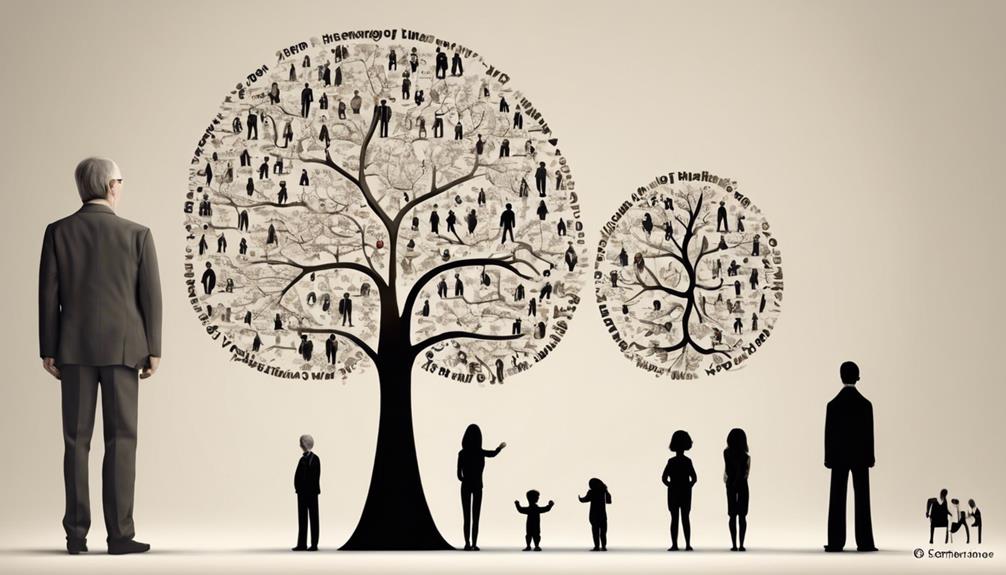In the advanced stages of Alzheimer’s disease, there is often a poignant interaction between profound vulnerability and enduring resilience.
As we navigate the complexities of this delicate phase, a myriad of emotions and considerations come to the fore, prompting us to reflect on the profound significance of each moment.
The journey towards the inevitable conclusion of this chapter is marked by a myriad of challenges and decisions that demand our utmost attention and compassion.
It is through these poignant moments that we are reminded of the resilience of the human spirit and the power of connection in the face of uncertainty.
Key Takeaways
- Compassionate care crucial in addressing physical and emotional needs at end-stage.
- Focus on comfort measures like repositioning and tailored nutrition plans.
- Recognize and manage cognitive changes, communication challenges, and behavioral shifts.
- Family and caregiver support vital in navigating emotional toll, strain, and potential burnout.
Understanding End-Stage Alzheimer’s Progression

As Alzheimer’s disease progresses to its end-stage, the gradual loss of cognitive functions and physical abilities becomes more pronounced and challenging for both the individual and their caregivers. It’s a difficult phase where memory loss is profound, communication becomes severely limited, and basic tasks like eating and dressing require full assistance. This progression can be emotionally taxing, both for the person with Alzheimer’s and those caring for them.
Understanding the changes that occur during this stage is crucial for providing the best care possible. Individuals may experience increased confusion, agitation, and behavioral changes. It’s essential to approach these challenges with patience, empathy, and a deep understanding of the disease process.
Caregivers play a vital role in ensuring the comfort and well-being of their loved ones during this challenging time. Providing a safe and structured environment, maintaining familiar routines, and offering gentle reminders can help ease some of the distress associated with end-stage Alzheimer’s. It’s also important for caregivers to seek support for themselves to navigate the complexities of caring for someone with advanced Alzheimer’s disease.
Physical Symptoms and Decline

In the end-stage of Alzheimer’s disease, individuals may exhibit a significant decline in physical function and experience a range of distressing symptoms. As caregivers, it’s crucial to understand and anticipate these changes to provide the best possible care and support.
Physical symptoms in this stage often include difficulty with mobility, leading to an increased risk of falls and injuries. Muscle weakness and loss of coordination may also be present, making everyday tasks challenging for the individual. Moreover, individuals may experience weight loss due to various factors such as decreased appetite, swallowing difficulties, or forgetting to eat. Skin breakdown, infections, and breathing problems can further contribute to the decline in physical health.
It’s essential to ensure comfort measures are in place, such as repositioning to prevent pressure ulcers and providing adequate nutrition and hydration. Additionally, maintaining a calm and soothing environment can help alleviate distress and enhance the individual’s quality of life during this difficult time.
Cognitive Impairment and Communication Challenges

Understanding the cognitive impairment and communication challenges that individuals face in the end-stage of Alzheimer’s disease is crucial for providing effective care and support. As caregivers, we must be aware of the following key points:
- Memory Loss: Patients may struggle to recognize even close family members, have difficulty recalling recent events, and may frequently repeat themselves.
- Language Difficulties: Communication becomes increasingly challenging as individuals may find it hard to form coherent sentences, struggle to find the right words, or even lose the ability to speak altogether.
- Disorientation: Patients may become disoriented and confused about their surroundings, leading to distress and agitation.
- Inability to Perform Daily Tasks: Simple tasks like dressing or eating may become overwhelmingly complex, requiring patience and assistance.
Behavioral Changes and Agitation

Behavioral changes and agitation can manifest as heightened restlessness and emotional distress in individuals in the end-stage of Alzheimer’s disease. These changes may be challenging for both the individual with Alzheimer’s and their caregivers. It’s important to approach these behaviors with patience, understanding, and a focus on comfort and safety.
| Behavioral Changes | Description | Tips for Management |
|---|---|---|
| Agitation | Restlessness, pacing, verbal or physical aggression | Provide a calm environment, use gentle redirection, ensure physical comfort |
| Repetitive Behaviors | Repeating words or actions, hoarding items | Establish a daily routine, offer meaningful activities, provide reassurance |
| Sundowning | Increased confusion and agitation in the late afternoon or evening | Maintain a consistent sleep schedule, limit caffeine and sugar intake, create a relaxing bedtime routine |
Understanding the underlying causes of these behaviors, such as discomfort, fear, or unmet needs, is crucial in managing them effectively. By addressing these factors with compassion and empathy, caregivers can help minimize distress and improve the quality of life for individuals in the end-stage of Alzheimer’s disease.
Nutritional Concerns and Weight Loss

Managing nutritional concerns and addressing weight loss becomes a critical aspect of care for individuals in the end-stage of Alzheimer’s disease. As caregivers, we must be attentive to these challenges and provide the best support possible. Here are some key considerations to keep in mind:
- Regular Monitoring: Regularly monitoring the individual’s weight and nutritional intake is essential to identify any changes or concerns promptly.
- Consulting Healthcare Professionals: Consulting with healthcare professionals, such as dietitians or doctors, can help create tailored meal plans that meet the specific needs of the individual.
- Encouraging Small, Nutrient-Dense Meals: Encouraging small, frequent meals that are nutrient-dense can help maintain adequate nutrition without overwhelming the individual.
- Providing Emotional Support: Offering emotional support and creating a calm, positive environment during mealtimes can help reduce stress and improve the overall eating experience for the individual.
End-of-Life Care Planning

When considering end-of-life care planning for individuals in the final stages of Alzheimer’s disease, it is crucial to prioritize comfort and dignity above all else. Our goal is to ensure that those in our care experience a peaceful transition with the utmost respect and compassion. In these moments, every decision should be guided by the person’s wishes and values, focusing on providing a supportive environment that promotes their well-being.
| Aspect | Considerations | Actions |
|---|---|---|
| Medical Care | Coordinate with healthcare providers to manage symptoms effectively. | Implement a care plan that prioritizes pain relief and symptom control. |
| Emotional Support | Offer emotional support to both the individual and their loved ones. | Provide counseling and resources to address emotional needs during this time. |
| Practical Arrangements | Assist in organizing legal and financial matters. | Help with advanced directives, wills, and other necessary paperwork. |
Palliative Care and Pain Management

In addressing end-stage Alzheimer’s death, our focus shifts to providing compassionate palliative care and effective pain management to ensure the individual’s comfort and dignity remain paramount. When dealing with this delicate phase, here are some key aspects to consider:
- Holistic Approach: We aim to address not only physical pain but also emotional, social, and spiritual distress the individual may be experiencing.
- Individualized Care Plans: Tailoring care plans to meet the unique needs and preferences of each person helps ensure their comfort and well-being.
- Regular Assessment and Communication: Continuous evaluation of pain levels and open communication with the individual and their family are essential for effective pain management.
- Multidisciplinary Team Collaboration: Collaborating with healthcare professionals, including doctors, nurses, social workers, and therapists, can provide comprehensive support and expertise for the best possible care.
Emotional Impact on Family and Caregivers

As caregivers, we often experience a profound emotional toll when supporting loved ones with end-stage Alzheimer’s.
The strain on family relationships can be immense, leading to feelings of isolation and frustration.
Caregiver burnout is a real risk, highlighting the need for support systems and self-care strategies during this challenging time.
Family Strain
Caring for a loved one with end-stage Alzheimer’s disease can place significant emotional strain on family members and caregivers. It’s crucial to acknowledge the challenges they face and provide support in various ways.
Here are some common difficulties experienced by families and caregivers in such situations:
- Emotional Turmoil: Feelings of sadness, frustration, and helplessness are common.
- Role Reversal: Adjusting to the changing dynamic as a caregiver can be overwhelming.
- Social Isolation: Caregivers may feel disconnected from their social circles.
- Financial Stress: The cost of care and medical expenses can add to the burden.
Support systems and open communication are essential in navigating these challenges together.
Caregiver Burnout
Navigating the challenges of caring for a loved one with end-stage Alzheimer’s can lead to caregiver burnout, impacting both family members and caregivers emotionally. The relentless demands of providing round-the-clock care, witnessing the progressive decline of a cherished family member, and managing the associated stress can take a toll on our well-being. Feelings of guilt, frustration, and overwhelming sadness are common as we grapple with the realities of this debilitating disease.
It’s crucial for us to recognize the signs of burnout, such as fatigue, irritability, and withdrawal, and seek support. Engaging in self-care practices, reaching out to support groups, and considering respite care options are vital steps in preserving our own mental and emotional health while caring for our loved one.
Spiritual and Existential Reflections

In facing the end stages of Alzheimer’s, individuals often find themselves seeking solace in spiritual and existential reflections. At this critical juncture, we must acknowledge the profound impact that these reflections can have on both the person with Alzheimer’s and their loved ones. Here are some key considerations to keep in mind:
- Finding Meaning: Encouraging individuals to reflect on their life’s purpose and the impact they’ve had on others can bring a sense of peace and closure.
- Seeking Forgiveness: Reflecting on past relationships and seeking or granting forgiveness can help alleviate any lingering guilt or regrets.
- Connecting with Faith: For many, turning to their faith or spiritual beliefs can provide comfort and guidance during this challenging time.
- Facing Mortality: Reflecting on one’s mortality and the inevitability of death can spur important conversations about acceptance and the legacy one wishes to leave behind.
Hospice Support and Services

When considering end-stage Alzheimer’s care, hospice support and services play a crucial role in providing compassionate and specialized care for both the individual and their family. Hospice teams are trained to address the unique needs of individuals with advanced Alzheimer’s disease, focusing on enhancing comfort and quality of life. These services encompass a multidisciplinary approach, involving healthcare professionals, volunteers, and counselors who work together to support not only the patient but also their loved ones during this challenging time.
Hospice care for individuals with end-stage Alzheimer’s disease includes symptom management, emotional support, and coordination of care to ensure the individual’s comfort and dignity. This specialized form of care aims to alleviate pain, manage distressing symptoms, and offer spiritual and emotional guidance. Additionally, hospice services extend beyond the patient, providing valuable assistance to family members by offering respite care, counseling, and bereavement support.
Dignity and Quality of Life Considerations

Considering the advanced stage of Alzheimer’s disease, maintaining dignity and ensuring quality of life become paramount priorities in end-of-life care. As caregivers, it’s essential to approach this phase with compassion and understanding. Here are some key considerations:
- Respect Autonomy: Even in the advanced stages of Alzheimer’s, individuals should be given choices whenever possible to maintain a sense of control and dignity.
- Comfort and Pain Management: Ensuring that the person is comfortable and free from pain is crucial. Regular assessments and adjustments to medication may be necessary.
- Emotional Support: Providing emotional support through gentle touch, soothing words, and familiar objects can help individuals feel secure and cared for.
- Maintaining Routine: Establishing a predictable routine can offer a sense of stability and familiarity, which can be comforting for individuals with Alzheimer’s.
Grief and Bereavement Process

As we navigate through the end-stage Alzheimer’s journey, we encounter the profound impact of loss. Coping with this loss requires a delicate balance of emotional support and understanding.
Healing after such a profound loss is a process that necessitates time, patience, and support from loved ones and professionals.
Coping With Loss
Navigating the journey of coping with loss after the death of a loved one to end-stage Alzheimer’s requires patience, self-compassion, and support from others. It’s important to remember that grief is a natural response to loss, and each individual experiences it uniquely. Here are some tips to help cope with the loss:
- Allow Yourself to Grieve: Give yourself permission to feel and express your emotions.
- Seek Support: Connect with family, friends, or a support group to share your feelings and experiences.
- Practice Self-Care: Take time for yourself, engage in activities that bring you comfort and relaxation.
- Memorialize Your Loved One: Honor their memory through rituals, creating a memory book, or participating in a charity event in their name.
Emotional Support Needed
After experiencing the loss of a loved one to end-stage Alzheimer’s, emotional support is crucial during the grief and bereavement process. It’s essential to acknowledge the range of emotions that may arise, such as sadness, anger, guilt, and even relief. Providing a compassionate presence and active listening can offer immense comfort to those grieving.
Encouraging individuals to express their feelings openly and without judgment is key to facilitating the healing process. Additionally, offering practical support with daily tasks or connecting them with counseling services can aid in navigating this difficult time.
Understanding that grief is a personal journey and respecting each person’s unique way of coping is fundamental in providing effective emotional support during this challenging period.
Healing After Loss
Supporting individuals through the grief and bereavement process after the loss of a loved one to end-stage Alzheimer’s is a critical aspect of promoting healing and emotional well-being. Here are four key strategies to aid in the healing process:
- Allow Yourself to Grieve: It’s essential to acknowledge and express your emotions during this difficult time.
- Seek Support: Surround yourself with understanding family and friends or consider joining a support group to share your feelings and experiences.
- Self-Care: Take care of yourself by maintaining a healthy routine, eating well, exercising, and getting enough rest.
- Memorialize Your Loved One: Find ways to honor and remember your loved one, such as creating a memory book or participating in a charity event in their name.
Reflections on Memories and Legacy

In our final moments with a loved one facing end-stage Alzheimer’s, we often find ourselves reflecting on the memories shared and the legacy left behind. As caregivers and family members, we witness the gradual fading of recollections and the profound impact of this disease on our loved one’s identity. Despite the challenges, there is solace in cherishing the moments of clarity and connection amidst the confusion.
| Memories | Legacy | Reflection |
|---|---|---|
| Shared laughs | Values passed down | Lessons learned |
| Tender moments | Impact on family | Growth observed |
| Favorite stories | Love and resilience | Strength in adversity |
These reflections serve as a testament to the enduring spirit of our loved one, beyond the grasp of Alzheimer’s. Each memory shared and lesson imparted becomes a part of the legacy we carry forward, inspiring us to continue serving others with compassion and understanding in their time of need.
Frequently Asked Questions
How Does End-Stage Alzheimer’s Impact the Relationship Dynamics Within a Family?
When dealing with end-stage Alzheimer’s, the dynamics within a family can be profoundly affected. As the disease progresses, caregiving responsibilities increase, leading to emotional strain and potential conflicts.
Communication may become more challenging, requiring patience and understanding. Family members may experience grief and a sense of loss as the loved one’s condition deteriorates.
It’s essential for families to seek support, prioritize self-care, and maintain open lines of communication to navigate this difficult journey together.
Are There Alternative Therapies or Treatments That Can Help Alleviate Physical Symptoms in End-Stage Alzheimer’s Patients?
Absolutely, there are alternative therapies and treatments available to help alleviate physical symptoms in end-stage Alzheimer’s patients. These can include music therapy, aromatherapy, massage, and even art therapy.
Each of these approaches aims to improve the patient’s quality of life by providing comfort and reducing distressing symptoms.
These non-pharmacological interventions can be tailored to suit each individual’s needs and preferences, offering a holistic approach to care in this challenging stage.
What Are Some Common Misconceptions About End-Of-Life Care Planning for Individuals With Alzheimer’s Disease?
Well, let me tell you, there are a few common misconceptions about end-of-life care planning for individuals with Alzheimer’s disease. One big myth is that all care planning needs to happen at the very end. In reality, starting early allows for more comprehensive and tailored care.
Another misconception is that individuals with Alzheimer’s can’t communicate their wishes. With proper support and resources, they can play a key role in decision-making.
How Can Caregivers Cope With the Emotional Toll of Providing Care for a Loved One With End-Stage Alzheimer’s?
Coping with the emotional toll of caring for a loved one in end-stage Alzheimer’s can be overwhelming. We understand the challenges caregivers face.
It’s crucial to prioritize self-care, seek support from others, and embrace moments of respite. Engaging in activities that bring joy and connecting with fellow caregivers can provide solace.
What Are Some Ways to Honor the Legacy and Memories of a Loved One Who Has Passed Away From Alzheimer’s Disease?
In our experience, honoring the legacy and memories of a loved one who’s passed away involves cherishing their life story, sharing anecdotes with others, creating a memory book or collage, participating in fundraising events for Alzheimer’s research, or planting a tree in their memory.
These acts can be comforting and meaningful ways to keep their spirit alive and honor the impact they’d on our lives.
Conclusion
As we navigate the complex journey of end-stage Alzheimer’s, we witness the gradual fading of memories and the profound impact on our loved ones. Like a delicate tapestry unraveled by time, we must embrace the beauty of each thread that remains.
Through compassionate care and support, we honor their legacy and cherish the moments that define their life. In the face of loss, we find solace in the enduring love that transcends all boundaries.








